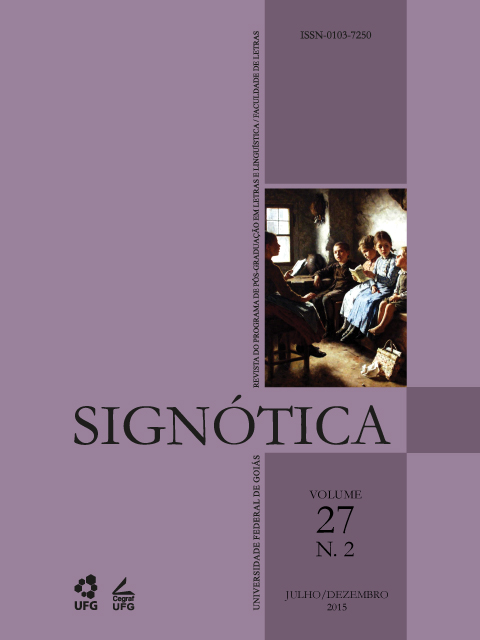Identifying and elderly as a speaker: an enunciative analysis
DOI:
https://doi.org/10.5216/sig.v27i2.31924Keywords:
Speaker, Elder, Enunciation, Subject-position.Abstract
The aim of the discussions presented in this article was to analyze the identification (or not) of a speaker with the subject-position of an elderly person. We selected an interview from the Portal do Envelhecimento (Aging Portal) website as the corpus of the analysis. In this interview, a book organizer describes her book-drafting process, whose theme focuses on issues related to aging. We based the analysis on the enunciative studies proposed by Benveniste (1989, 1995) and Guimarães (1989, 1995, 1996, 2005). This theoretical approach allowed us to observe how the enunciation was established in that interview. By observing the use of personal pronouns, we performed the linguistic analysis of this material. This enabled us to establish the interviewed author as the focus and, therefore, as the main speaker. As for the other people brought into this enunciation process, the interviewer was referred to as you and the elderly as he. In general, the analysis highlighted the following considerations: a) in the enunciator’s speech, there is a deletion of the you and an alternation between the I and the we, when referring to the first person; b) the use of the we, in some situations, joins the speaker to the group who helped to produce the book, and in others, it is not defined, allowing the interpretation of the he (the elderly) as included; c) such use of pronouns shows that the speaker builds just an implicit identification of the elderly in thesubject-position.
Downloads
Download data is not yet available.
Downloads
Published
2015-12-22
How to Cite
BAZZA, Adélli Bortolon; NAVARRO, Pedro. Identifying and elderly as a speaker: an enunciative analysis. Signótica, Goiânia, v. 27, n. 2, p. 437–460, 2015. DOI: 10.5216/sig.v27i2.31924. Disponível em: https://revistas.ufg.br/sig/article/view/31924. Acesso em: 10 feb. 2026.
Issue
Section
Article
License
Author (s) authorize Signótica to publish an article, if accepted, signing its contribution as original and not submitted to another publisher for publication. In case of acceptance and publication, Signótica's articles are Creative Comons BY-NC-ND (Attribution + Non-Commercial + Non-Derivatives)





1.png)





